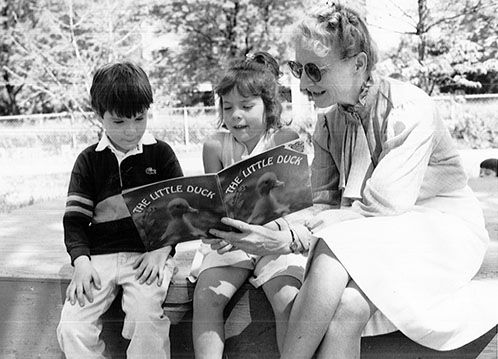During her senior year of high school, Kathryn Aschliman and her parents met with I.E. Burkhardt and Leland Bachman, two representatives of Goshen College. As they sat around the Aschlimans’ dining room table, the representatives discussed the need for teachers.
After the conversation, Aschliman’s parents thought it would be a good idea for her to attend college and become a teacher. She did so and began a lifelong commitment to education.Aschliman began attending Goshen College in 1948. After taking classes for two years, she began teaching first grade in Archbold, Ohio at the age of 19. She returned to Goshen in 1953 and graduated in 1954.
After graduating, Aschliman first found work with Herald Press, a publishing house and then as a teacher in an Amish community. She later moved to Chicago to work with three- to five-year-olds at a church daycare.
However, Aschliman was continually called back to Goshen. While working in Chicago, the college invited her back to work in the early childhood department. The position at Goshen College allowed her to teach students who would go into the world and change things.
“I had the best job on campus,” Aschliman said of directing the kindergarten.
Through this job, she engaged with community members and students as well as work with different parts of the kindergarten, like recruitment, enrollment, budgeting, arranging transportation and doing home visits so students would feel ready to go to school.
Before the kindergarten was a part of the public school system, it was private. Aschliman cared deeply about diversity, so while she was in charge, she worked hard to provide scholarships every year so a diverse group of children would attend the kindergarten.
“She was not the first teacher in the college kindergarten, but she really developed that kindergarten program and her imprint is still on the kindergarten program,” said Kathy Meyer Reimer, professor of education. The two worked as colleagues at Goshen College for about six years.
The laboratory classroom on campus is unique to Goshen College. Its continued existence is due in part by the work Aschliman did to keep it open. She did fundraising through phonathons and helped to begin an endowment. It continues to be an integral part of the college campus.
It was important to Aschliman that kindergarteners learned through playing. She said, “Children’s most effective mode of learning is through doing.” When kids are self-directed under a watchful eye, they develop creativity, imagination, cooperation and other skills in addition to academic foundations, including language development.
“Hopefully, there is opportunity to explore the arts, too,” said Aschliman.
She liked to base curriculum on experiences, which led to adventures like camping out, where kids roasted marshmallows, slept in pop tents or in a school bus set up as a camper and had breakfast by a campfire.
Aschliman also used part of her own salary to pay international students to act as assistant teachers in the kindergarten. The students came from a number of different countries, including India and Korea, and they could get credit for working in the classroom.
Aschliman still remembers her kindergarten students, many of whom are grown up with their own families. One student is Merrill Krabill, professor of art at Goshen College.
“I vaguely remember the space we were in — the outside was much less developed. I remember there was a one-way glass observation room that fascinated me,” said Krabill.
He didn’t remember anything else about his kindergarten days, but said that Aschliman has always been attentive to her former students.
A few years ago, Aschliman began giving back old Valentine’s Day cards given to her by her students. In one case, she learned that one of her students worked at a hair salon in town.
“When I walked into the salon, I asked to speak to Monica,” said Aschliman. “Before I said much more, she blurted, ‘Miss Aschliman.’ We were immediately drawn into a warm hug.”
Aschliman said that she was able to find her former student after calling the phone number she had for the woman’s parents from when she was in kindergarten in 1972.
“Her father told me about her business in that little strip mall in Waterford, so I just stopped in one day,” said Aschliman. The former student was moved to tears by the old Valentine, causing Aschliman to tear up as well.
Aschliman officially retired in 1996, but that doesn’t stop her from continuing to stay involved on campus. At 88 years old, Aschliman spends time in her office in the campus library.
Reimer said that Aschliman always put children and other people first.
“Kathryn always makes things about the other person,” said Reimer. “One of my favorite memories of her is that she forged a relationship with the Gary Head Start teachers and every summer, Gary would send over a number of teachers to take some courses.” The teachers would work towards a certification in early childhood education.
“[The teachers] were totally committed to her, totally committed to the program,” said Reimer. “There are many ways that’s sort of the epitome for me of her life. She has given her life to early childhood education and to the people who provide it.”
In 2017, a Peace Arts collection, located in the basement of the library, was opened to honor Aschliman’s work. It is compiled of peace materials that she was instrumental in starting on campus and includes things like books, props and curriculums used to teach children about peace.
Reimer said that Aschliman cares deeply about providing what would now be called social justice education, though Aschliman would call it peace education.
Aschliman never married, even though that was the path many women of her generation chose. Instead, her passion for early childhood education was her life’s work and continues to be her legacy.



